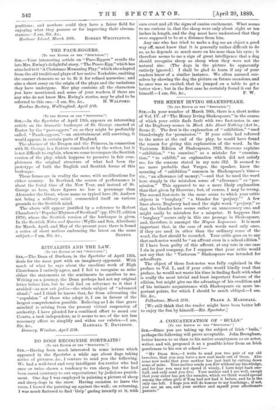[To THE EDITOR OF THE "SPECTATOR."]
Sut,—In the Spectator of April 13th, appears an interesting article on the dramatic burlesque of St. George enacted at Easter by the " pace-eggers," or, as they might be preferably called, " Pasch-egg-ers,"—an entertainment still surviving, it would appear, in certain parts of England.
The absence of the Dragon and the Princess, in connection with St. George, is a feature remarked on by the writer, but it is not difficult to explain, when we come to compare the Scottish version of the play, which happens to preserve in fair com- pleteness the original structure of what had been the prototype of both the English and Scottish forms of this burlesque.
These forms are in reality the same, with modifications for either country. In Scotland, the season of performance is about the festal time of the New Year, and instead of St. George as hero, there figures no less a personage than Alexander the Great, whose name as typical hero (St. Andrew not being a military saint) commended itself on various grounds to the Scottish mind.
The above will appear justified by a reference to Robert Chambers's "Popular Rhymes of Scotland" (pp. 170-77, edition 1870), where the Scottish version of the burlesque is given. In the Scottish Notes and Queries (Wyllie and Son, Aberdeen) for March, April, and May of the present year, there is found a series of short notices embracing the latest on the same


































 Previous page
Previous page